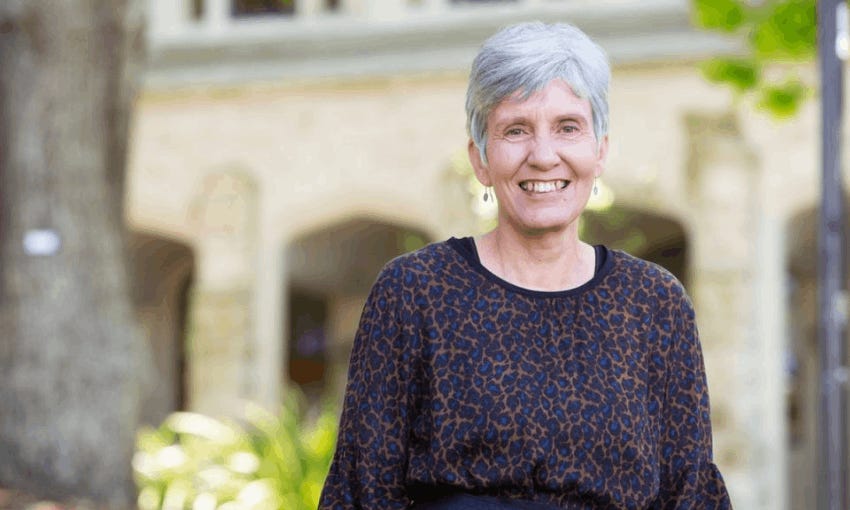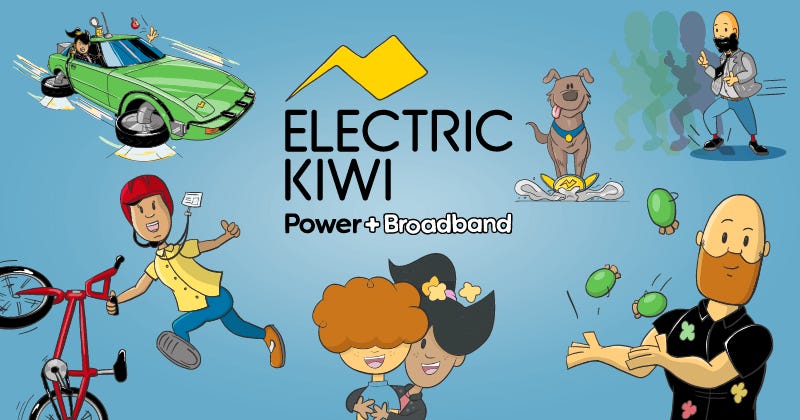Happy copycats: What psychology says about taking climate action
Berating people with bad news isn’t conducive to making change. Professor Niki Harré tells us what psychology says about sustainability that sticks.
Haere mai, welcome to Future Proof, brought to you by Electric Kiwi.
I’m writing this edition by the light of a headtorch. Like many in northern Aotearoa, the power is out at my place in the midst of fierce winds and battering rain. It’s been a soggy winter so far, with flooding, slips and generally sodden miserable vibes. On Monday’s 6 o’clock news, a rep from Federated Farmers told 1News, “No farmer in Northland will dispute global warming,” adding that they had yet to see a Far North frost this winter. So what are we doing about it?
In the first edition of this newsletter, I mentioned survey results showing that although lots of us care about climate change, fewer of us take action in our daily lives. Why does this gap exist? Maybe in some cases we don’t know what actions to take, or sometimes it’s just tricky to do the sustainable thing. Plus, when you read about “climate criminal” celebrities taking 17-minute flights in their private jets, composting that spinach past its use-by date might seem, well, pointless. I feel you. You are not alone. And therein lies the secret: there is power in numbers.
Professor Niki Harré from the University of Auckland was drawn to study the psychology of sustainability when she first learnt about climate change and realised it was “unreservedly my problem, as it is everyone’s problem”. She researches how to engage people in creating a more sustainable and equitable society, using psychology.
Professor Niki Harré. (Photo: Dean Carruthers/University of Auckland)
“There’s some sort of assumption that if we simply repeat how bad the situation is and how much we need to change, this will magically result in people altering their lives,” says Harré. “What that misunderstands is the way in which life is interwoven with a whole series of different values and demands. And it’s very difficult to just pick out one and just change that.”
Part of it has to do with how our systems and society are set up – for example, we’re unlikely to cycle if there isn’t safe cycling infrastructure. Or there may be other life practicalities that get in the way of a more sustainable choice. Some of it can be chalked up to our social networks and organisations, and the norms within those.
Harré reckons that organisations in particular have potential for change that’s “big enough to start to get a bit of traction”.
“I think organisational level change holds this really good space between the difficulty of doing something as an individual, and the hugeness of it all,” she says. Embedding sustainability in our workplaces, educational institutions and governments is like planting a seed in fertile soil – you’re more likely to get results that stick, and spread like weeds.
This is partly because humans are copycats, mimicking those around us. “The more we hear about it, see it demonstrated, consider it viable for people like us, the more likely we are to do it,” says Harré.
But focusing on change at the organisational level doesn’t mean you should stop toting around your reusable coffee cup. For me, for Harré, and hopefully for you, it’s about living consistently with our deeply held values.
“I don’t know how you avoid individual action if you care,” says Harré. “To me the question of whether it’s worth it or not is irrelevant – to me it’s an aesthetic thing, a moral thing, an emotional thing. I don’t want to chuck things in landfill, waste food – that’s just not who I am.”
There’s another key ingredient for change: positive emotions. After all, we’ve got to keep living while we try to make the world a more sustainable place.
In her book, Psychology for a Better World, Harré notes that positive emotions elicit creativity, a desire to connect with others, and openness to change – all things we need if we’re going to tackle climate change and foster a truly sustainable society.
Harré invites us to experiment with emotion: “Think about whatever scares you most about climate change, and you can actually feel a sort of an inward turn, that closing down, and that sense of desperation that something needs to be done urgently. Whereas with positive emotions, you can feel that sense of possibility, wanting to join with others, a kind of sense that there are multiple ways to deal with this.”
So this brings us back to how we talk about climate change. We can lay out facts “without the catastrophising and the fear, but not straying from the truth”, according to Harré.
“I do wish people would think really hard about what they’re conveying to young people,” she says. “When a young person is right in front of you, you can see what a treasure that person is, and all their vulnerability. Then, it’s brutal, really, to insist to a young person that the planet is in dire straits and nothing is being done about it.”
Like me, you may find the doom and gloom exhausting and overwhelming. But dystopia isn’t a given for our future, and perhaps it’s time we start imagining something better, and start embracing being happy, sustainable copycats. I hope that Future Proof can offer a glimmer of hope, grounded in reality, for everyone. Because when it comes to the environment, sustainability and climate change, as Harré says, “Nobody is out of place here – this is all of our issue in a very genuine way.”
Electric Kiwi is an independent power company working to make things fairer for all New Zealanders – and now they offer broadband too.
Sign up with Electric Kiwi for your power and you'll get guaranteed savings and an hour of free off-peak power every day. Their broadband won't lock you into any fixed-term contracts, you pay by the day (it’s the fairer way) and there’s no pesky notice periods either, just fast speeds and low prices.
Check out Electric Kiwi's electricity and broadband offers today.
Every fraction of a degree matters
With an unusually stormy winter here in Aotearoa and record-smashing heatwaves across Europe, the weather impacts of climate change have been front-and-centre in media this past week. Newshub Nation talked to University of Waikato researcher Dr Luke Harrington about what this means for Aotearoa. Could we see more extreme heatwaves too? Possibly – but Harrington also hammered home the message that every little bit of warming we avoid is worth it.
Students take minister to court over fossil fuel exploration permits
The group Students for Climate Solutions has taken the energy minister Megan Woods to court. Why? Well, we probably need to stop extricating carbon-emitting fossil fuels from the bowels of the Earth if we want to reach net zero carbon emissions by 2050, and limit global warming. But last year, the government issued two permits for onshore fossil fuel exploration in Taranaki – and the students say that’s not on. Stuff’s climate reporter Olivia Wannan has a rundown of the first day in court.
Finding hope in the climate crisis
Speaking of students, Mika Hervel writes in Salient about finding slivers of hope in the midst of climate woes. We have made some progress in the last 10 years, shifting our climate trajectory from four-degree warming by 2100 to three degrees. And we can draw hope from other sources outside of incremental positive progress – especially from each other.
Meet the trap-building retirees
These residents of a Ryman retirement village in Canterbury are using their free time to build hundreds of traps for local environmental groups. I loved this story about 75-year-old Lynn Andrews capitalising on his love of woodwork to help the Predator Free 2050 movement. Plus, it’s a perfect example of the organisational change Harré thinks is most powerful. With new trap-making hubs popping up at other retirement villages, you can see how contagious this style of sustainability is too.
Like what you’ve read today? Share Future Proof with friends, family and colleagues.
To tackle impacts of climate change, look to tīpuna
An important piece this week about the impacts of climate change on Māori, by Dr Shaun Awatere in e-Tangata. Sea level rise won’t just affect dwellings and homes, but also wāhi tapu and urupā – resulting in tricky decisions for iwi and hapū. Awatere writes that Māori need to decide on their own terms what to do – which means governments need to share power – and suggests looking to tīpuna for inspiration on how to respond.
Shift focus to actually cut emissions, says Climate Change Commission
The Climate Change Commission has weighed in on the Emissions Trading Scheme (ETS), which charges different sectors for the greenhouse gases they emit. The commission is calling for different rules for activities that suck up carbon (e.g. planting pine trees) versus those that actually cut production of carbon-emitting gases in the first place. Stuff’s Eloise Gibson and Olivia Wannan have all the details, including the ramifications for households.
Bring back the biodiversity
Biodiversity offers more than just carbon storage, writes ecologist Dr Colin Meurk. It also offers “native wildlife food, a unique sense of place, a rich story to tell that reaches back to Gondwana and to the first peoples of the land”. These are just a few of the reasons Meurk outlines for bringing back biodiversity into Ōtautahi Christchurch – a journey that is already under way.
Take a walk in the ngahere
If you’re stuck inside due to the wild weather, or isolating on the couch with Covid or a cold, you can still try a little bit of forest bathing – virtually – with botanist Taylor Davies-Colley. Taylor led a livestreamed tour of the lush bush in Ōtepoti Dunedin recently. His enthusiasm for our native rākau is infectious, and you’ll likely learn a few fascinating facts too.
To finish off, the dates for Bird of the Year 2022 have been announced. Plus, two fan favourites aren’t running this year: last year’s winner, the pekapeka-tou-roa / long-tailed bat, and the two-time champion kākāpō. I’m helping run New Zealand’s favourite election this year, and we’re hoping you’ll consider an ‘underbird’ as part of your vote – and maybe meet a new feathered friend you didn’t know about before.
Got some feedback about Future Proof or topics you’d like covered? Get in touch with me at futureproof@thespinoff.co.nz


















It's not difficult to appreciate Niki's points (I've worked with people in social work, group work and psychotherapy most of my life.) For the past 15 years my focus has been on climate change, which I consider to be the greatest social justice issue humankind has ever faced. From all of my reading and activism I have reached the understanding that unless we collectively act very quickly, we and most other creatures on the planet will expire before the end of this century. That is not an extremist position. Scientists everywhere will confirm it. Faced with that probability treating people gently is simply not going to cut it. We need at least the similar treatment we had for Covid-19. We are in an extreme emergency! Every Friday morning for the past 31/2 years I have stood in a public place in my town attempting to highlight the issues, inviting people to pay attention and ACT. While many people support me, in general there is little change in people's behaviour. I fear that Niki's approach will simply not prompt urgent enough action, given the general tendency for people to opt for the status quo.